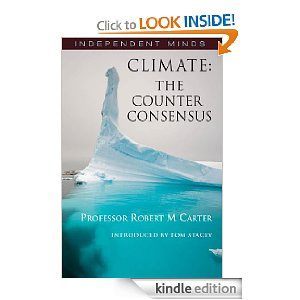A few months after I began researching the climate debate in earnest I drove south to Washington, DC. A skeptic’s conference was being held there, in June of 2009, sponsored by the Heartland Institute.
Having read some books and blogs by then, the concerns raised by skeptics seemed reasonable and persuasive. But that was a judgment I was making from afar. A more direct assessment was in order – it was important to take the temperature, so to speak, of a room in which skeptics had congregated.
The conference was a one-day affair in which two dozen scientists, economists, and politicians presented their point-of-view to an audience of 250. The majority had been allotted 15 minutes of speaking time as part of a panel discussion.
The person who impressed me the most that day was a bearded, bespectacled Australian geologist named Bob Carter. Neither loud nor brash he seemed to me to be closer to a stereotypical Canadian than a stereotypical Aussie.
Having spent nearly 24 hours on a plane to get there, Carter used his 15 minutes to explain why the mindset of the Intergovernmental Panel on Climate Change (IPCC) jeopardizes public safety.
The IPCC, he pointed out, is fixated on global climate. As a result, governments around the world are incorporating that idea into their long term planning. But as Carter explains in his 2010 book, Climate: The Counter Consensus, “no-one, but no-one, lives in a global climate.”
The natural disasters that kill people are local phenomenon. The risks we face depend on where we reside.
Carter made this point by comparing the natural hazards that threaten Australians versus New Zealanders. Being so near to one another, one might expect their concerns to be virtually identical. But New Zealand has geological fault lines to worry about.
In Carter’s fateful words, “It’s not a matter of if there’s a major earthquake, it’s a matter of when there’s a major earthquake” (less than two years later an earthquake near Christchurch killed 184 people and caused widespread damage). Earthquakes and volcanic eruptions top the list of natural hazards for which New Zealanders need to be prepared.
Just a short hop across the Tasman Sea, however, matters are utterly different. In a country as drought-prone as Australia, bush fires are an ever-present danger – as is flooding. In Carter’s words, the chances of an earthquake there “are small and of a volcanic eruption almost zero.”
Although they are next door to each other, government planners in New Zealand and Australia need to focus on different concerns if their respective populations are to be protected from natural hazards. Instead, the IPCC expects both of these nations to devote enormous amounts of public funds and government attention to worrying about a theoretical average global temperature that poses no direct harm to anyone.
A few years ago Carter described himself as a Johnny-come-lately to the climate debate. Tipping his hat to other scientists who’ve been attempting to inject a less alarmist tone into public discussions since the early 1990s, Carter remarked:
I only lifted my eyes up from a microscope around the turn of the century. I’ve only been doing it for eight years, and my God, I’m tired.
Carter’s view of climate science is profoundly influenced by the fact that he’s a geologist. He thinks in terms of geological time – eras and epochs. When compared to those timescales, 150 years of thermometer readings is a mere blink of an eye. As he writes in his accessible, well-argued book:
By overemphasizing the trivially short instrumental record, and greatly underemphasizing the varied changes that exist in geological records.the IPCC signals its failure to comprehend that climate change is as much a geological phenomenon as it is a meteorological one.
All of the above is a long-winded way of saying that a public that has heard about Al Gore’s ideas but not Bob Carter’s is a public that has been spectacularly ill-informed. A debate that includes one of these voices but not the other is no debate at all.
Today QuadrantOnline has published the first of a 3-part series written by Carter. It’s a round-up of happenings in the climate world during 2011 – with an emphasis on the Australian situation. You can read it here.






